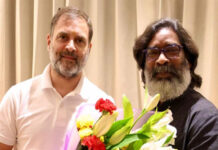Government of India is proposing an incredibly essential electoral reform; it is for conducting simultaneous elections across the country for Assembly & Parliament replacing the existing system of yearlong election schedules. Government of India is willing to undertake a constitutional amendment to execute this reform, if it gets majority support to pass it in both houses of the parliament.
Change is always resisted, as it challenges the status quo. Mostly people are happy with status quo, as it gives them a presumptive sense of security. Political parties are no exception; in fact they are more sensitive to change, with their consistent & constant insecurities. ‘Election’ is a huge enterprise in India. The stake holders in this mega political bonanza are too many & too complex to deconstruct.

While the election process looks simpler for an ordinary voter, the complexity lies not in its administration or logistics but the massive electoral politics, voter management & vote bank politics behind it. It’s certainly a massive endeavor involving lakhs of people, crores of funds, months of effort & whole lot of politics. Branches of Government, enforcement agencies, election officers, election financiers, campaign managers, media houses, publishing houses, promotion companies, logistics companies, political party workers, voter managers, voter dealers, cash managers, food & beverage managers…the list of stakeholders in this festival of democracy is quite long.
Every time there’s an election, all these forces have a field day at building their revenues both legitimate & illegitimate. Elections are central to any democracy & its importance cannot be underrated in the largest democracy in the world. The central problem today in India is not elections, but the way they have become the costliest & largest engagement of the government, political parties, contestants & voters.
Almost all the governance & administrative process slows down every time an election is notified to make way for it. With two major national parties in the country, no matter which party is in the central government, the head of the government & the council of ministers are compelled to be vote seekers than to play their assigned constitutional roles. A national government elected for 5-year term need to focus on its manifesto promises & its unique governance agenda with undistributed focus to ensure people’s mandate is respected & expected outcomes delivered.

However, assembly elections of various states sprayed across the 5-year term, engages the elected government heads & legislature to constantly deviate from their constitutional roles to fulfill their political obligations as leaders of their parties. Another huge self-defeating outcome of the current system of elections is that, the intermittent assembly elections across the 5-year term of central government render the autonomous election watch dog ‘The election commission’ as a toothless agency, which is perennially engaged in the planning logistics of conducting elections, and not in enforcing the ethical electoral practices & rules, which is a part of their larger constitutional role. No wonder, the Election Commission of India’s record of successful convictions in the election malpractices & violations is dismal.
There’s a clear & present danger that Indian government’s potential to govern & lead this nation towards greatness diminishes year after year, with its constant deviation from development oriented governance to administering elections and active political participation all year long.
If the current system is reformed & simultaneous elections are conducted for Assembly & Parliament at once, there will no major distraction for either the state or central government for a full elected term of 5 years & they can focus on governance, for which they are elected. If the current electoral system is not reformed to make way for more plausible & practical electoral system with simultaneous assembly & general elections, the ‘largest democracy’ on this planet can never be the ‘greatest democracy’.














